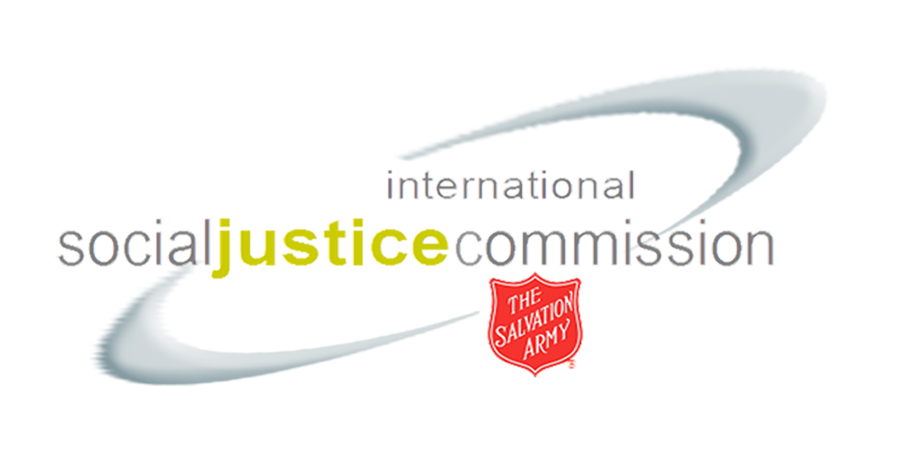|
ISJC News for Prayer and Thanksgiving
The opening of the new USA Southern
Territory Social Justice Centre in
Nashville
The meeting of the International Anti-
human Trafficking Task Force on 17 and
18 February, and anti-human trafficking
initiatives that are being developed
around the world
The annual Commission on the Status of
Women to be held at the UN in March,
which a number of Salvationist delegates
will attend. The ISJC hosted almost 100
side events in 2015 and expects a
similar number this year. Pray for those
involved in the planning and those taking
part. Pray that the ISJC may be a
showcase, not just for The Salvation
Army but also for God.
The Accountability Movement is being
promoted across The Salvation Army at
present. Pray that all Salvationists will
respond positively to General André
Cox’s invitation to get involved
SDG 5 Targets
5.1 End all forms of discrimination
against all women and girls everywhere
5.2 Eliminate all forms of violence
against all women and girls in the public
and private spheres, including trafficking
and sexual and other types of
exploitation
5.3 Eliminate all harmful practices, such as child, early and forced marriage and
female genital mutilation
5.4 Recognize and value unpaid care
and domestic work through the provision
of public services, infrastructure and
social protection policies and the
promotion of shared responsibility within
the household and the family as
nationally appropriate
5.5 Ensure women’s full and effective
participation and equal opportunities for
leadership at all levels of decision-
making in political, economic and public
life
5.6 Ensure universal access to sexual
and reproductive health and reproductive
rights as agreed in accordance with the
Programme of Action of the International
Conference on Population and
Development and the Beijing Platform for
Action and the outcome documents of
their review conferences
5.a Undertake reforms to give women
equal rights to economic resources, as
well as access to ownership and control
over land and other forms of property,
financial services, inheritance and
natural resources, in accordance with
national laws
5.b Enhance the use of enabling
technology, in particular information and
communications technology, to promote
the empowerment of women
5.c Adopt and strengthen sound policies
and enforceable legislation for the
promotion of gender equality and the
empowerment of all women and girls at
all levels.
|
Although gender equality has an SDG all of its own, it also plays a part in the other
16 SDGs. An International Labour Organization (ILO) report states:
‘Gender disparities in poverty are rooted in inequalities in access to economic
resources. In many countries, women continue to be economically dependent
on their spouses. Lower proportions of women than men have their own cash
income from labour as a result of the unequal division of paid and unpaid
work. In developing countries, statutory and customary laws continue to
restrict women’s access to land and other assets, and women’s control over
household economic resources is limited. In nearly a third of developing
countries, laws do not guarantee the same inheritance rights for women and
men, and in an additional half of countries discriminatory customary practices
against women are found. Moreover, about one in three married women from
developing regions has no control over household spending on major
purchases, and about one in 10 married women is not consulted on how their
own cash earnings are spent.’ (ILO Report: Achieving Stronger Growth by
Promoting a More Gender Balanced Economy, 2014)
This quote shows how gender inequality impacts on the first SDG of ending poverty.
Another ILO report on women in business noted:
‘It’s generally recognised that some of the main obstacles holding women
back are gender stereotypes, corporate cultures, difficulties in reconciling
work and family responsibilities as well as more subtle forms of gender biases
which sometimes exist in educational systems and the workplace which
results in women being lower paid and under-represented in decision-making
positions.’ (ILO Report: Women In Business and Management: Gaining
Momentum, 2015)
And yet, as important as gender equality is in business and economically, this is
minor when compared to the disparity it produces in levels of access to education
and health. Two thirds of the 781 million people in the world over the age of 15 years
who are illiterate are women. Poorer health in women is associated with lack of
access to information and education, early marriage and a lack of decision-making
power. (UN Report: The World’s Women, 2015)
However, the most shocking result of gender inequality is seen in the violent abuse
of women and girls, both physically and sexually. Research shows that one third of
women worldwide have experienced physical or sexual violence by their intimate
partner and yet less than 40 per cent of women sought help following an assault,
with only four per cent seeking help from police, suggesting that this reluctance may
be linked to the widespread acceptability of violence against women. There are 125
million women who have undergone female genital mutilation. (UN Report: The
World’s Women, 2015)
According to the UN Office on Drugs and Crime (UNODC), women and girls continue
to be killed in large numbers worldwide. In 2012, for example, at least 43,000
women were murdered by their intimate partners or family members. (UNODC
Report: Global Study on Homicide, 2013)
Eighty per cent of people who have been victims of human trafficking are women
and girls, and it is thought that of all people trafficked up to 70 per cent may be for
sexual exploitation (Trafficking In Persons Report, 2015), which often includes
repeated rape.
In a statement issued during the 24th Session of the Commission on Crime
Prevention and Criminal Justice in May 2015, Yury Fedotov, Executive Director of
UNODC said: ‘Violence against women and girls, in all its many forms, shames us
all… We must also acknowledge that, just as no society is immune from these
violent acts, we are all part of the solution. To end this serious crime, we must all
work in a spirit of partnership and cooperation to change laws, change perceptions
and change behaviours.’
As Mr Fedotov implies in his statement, people’s behaviour is a reflection of their
thinking. The treatment of women around the world reflects the way women are
thought of as less than men by a vast number of people in many nations. It is a way
of thinking that The Salvation Army has always rejected.
The Salvation Army believes that all people are of infinite and intrinsic worth and
each person is a precious being, male or female – they are equal in the sight of God
and loved by him. Discrimination on any basis, whether it be colour, race, tribe,
religion, age, disability or gender was unacceptable to Jesus and therefore is
unacceptable to his followers. Abuse and exploitation in any form is directly
opposed to Jesus’ command to ‘love your neighbour as yourself’ (Luke 10:25-37),
the principle by which we are called to live.
William Booth’s famous ‘I’ll fight’ speech, includes the words: ‘While women weep
as they do now … while there remains one poor lost girl upon the street … I’ll fight,
I’ll fight to the very end.’
William Booth was promoted to Glory (died) more than 100 years ago, but The
Salvation Army he and his wife Catherine founded remains active, and while the
social injustice that inspired his speech remains within our communities we are still
called to participate in the fight against evil and to promote God’s Kingdom values
wherever we are.
Reflecting for Action and Prayer
Please take time to read the focus of the targets associated with this goal and pray
that God will equip and empower people, local corps (churches) and the
international Church to take action as they aim to bring gender equality for all.
|


























